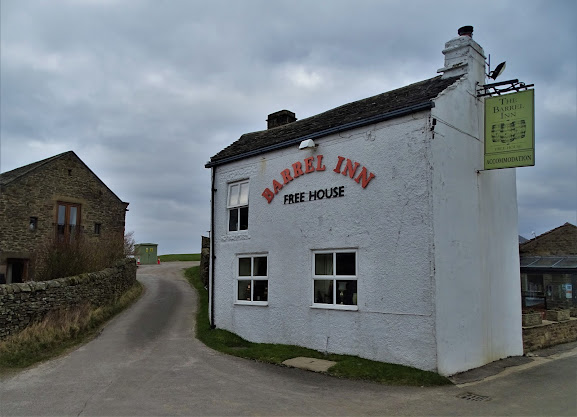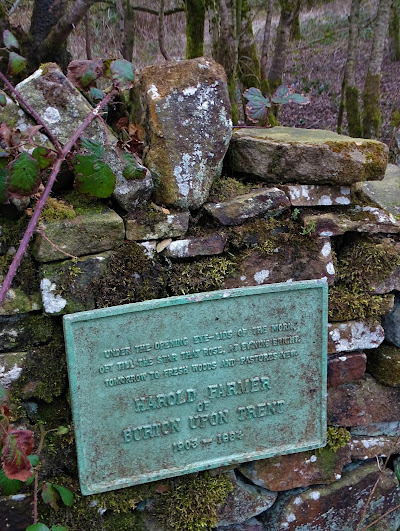Yesterday I returned to Sir William Hill to undertake a longer walk. It was cloudy, chilly and few other people were out and about. I checked out a long abandoned sheep farm that I have visited before, above the Highlow valley to which I descended.
I had no map and after leaving the footbridge at Stoke Ford, I headed up the valley of Bretton Brook. The path was sometimes unclear and I had to be as alert as an Indian scout in a cowboy film. Over two streams, across boggy land and then up to ancient lead mine workings with conical spoil heaps now clothed in vegetation.
Then, in the shadow of Abney Grange Farm, I climbed up and up to the one-track lane on the ridge that took me back to Bretton Mount. That is where "The Barrel Inn" is located but shut for months because of the pandemic.
Before I reached Lord Clint of Clintshire, I passed a small stone-walled enclosure. Perhaps the original intention had been to maintain a little memorial garden but now it is wild and neglected. For the first time, I noticed a plaque on the roadside wall in memory of a gentleman called Harold Farmer of Burton-upon-Trent. Born in 1903, he died in 1984. I know nothing else about him.
In addition to his basic details, there was a piece of verse:-
Under the opening eye-lids of the morn
Oft til the star that rose, at ev'ning bright,
Tomorrow to fresh woods and pastures new
The lines come from "Lycidas" by John Milton - written in 1634 and revised in 1645. In its day this lyrical poem was popular and famous, capturing as it did religious issues of that troubled period in our history. But the peculiar thing about the three lines on Mr Farmer's plaque is that they do not sit together in the poem. The first line is the fourth line of the poem's third stanza, the second line is the eighth line of that same stanza and the third line is the last line of the eleventh stanza and indeed the last line of the poem.
I am not sure that Milton would have approved of his poem being broken up in this manner but it was nonetheless nice to see poetic lines on a plaque in the heart of the north Derbyshire countryside.
Speaking of poetry, when I got back to Lord Clint he was reciting a love poem to a cute little pink Fiat 500 who was parked in the same rough and ready lay-by:-
To bed a sweet Fiat Five Hundred
Is a fantasy I have oft wondered
To take thee to a car park late at night
And wax thy chassis with all my might
"You lecherous beast!" I yelled, pressing the button on my electric key fob. I could see that the Fiat 500 was trembling though I knew not if it was with fear or desire. It is so hard to read Italians.






Just Googled the Barrel Inn. It dates back to 1597. I wonder if beer prices have changed?
ReplyDeleteI first went in that pub forty years ago. Since then it has become more of a restaurant than a pub but at least it is surviving.
DeleteDear Neil,
ReplyDeleteWe have been most intrigued by the reference to Milton in the words inscribed on the plaque. The words from Lycidas seem apposite for this pastoral scene and clearly a tribute to someone who was in tune with nature and the rural way of life.
One can only wonder who Harold Farmer was to have deserved this touching memorial. And, of course, to reflect upon the countless numbers of walkers who have passed this point and reflected upon those delightful words of MIlton.
Yes. It is a mystery. I tried a little to find out about him via Google but to no avail.
DeleteOh Clint! To be a car in spring.
ReplyDeleteThe oil is pumping through his veins.
DeleteClint seems to be rather uncouth, YP. Perhaps you could enrol him in obedience classes?
ReplyDelete"Uncouth" is a good word to describe Clint. In this he is so different from his cultured owner.
DeleteHow odd that the poem was mixed-and-matched that way. Maybe those were Harold's favorite lines?
ReplyDeleteI remember reading Milton in high school English and being unable to make heads or tails of it. He was never my favorite. I'm just not religious enough.
I studied "Paradise Lost" at university and I admired Milton's wordsmithery.
DeleteI'm sure many people have also been by the plaque and didn't notice it. So you've given yourself some home. Who was this guy and what's with the poetry?
ReplyDeleteA mystery man I am afraid Red. Maybe he was just a rambler who loved that spot.
DeleteI love Lord Clint's poem and perhaps if he wishes to woo a foreign lass, he needs to learn her language.
ReplyDeleteGood idea. Also, Italian is a sexy language.
DeleteClint's writing is almost erotica. Who knew such intense desires dwelled beneath his ordinary bonnet. The world is full or surprises.
ReplyDeleteThe red German cars are the worst. Like wild beasts they are.
DeleteHow I long for a walk like that! Since the 2nd of January, all my walks were in and around my town, all of them familiar almost (only almost) to the point of boring.
ReplyDeletePerhaps you should try virtual walks on your computer. You won't get wet and you won't fall down.
DeleteClint obviously needs to brush up his wooing tactics YP., or maybe he was spurned? A bucket of cold water over him may have helped cool his ardour....
ReplyDeleteI remember studying Milton poems at school, but don't recall that I was ever enamoured of his work.
Did you use that tactic when your past suitors came on too strong CG?
Delete